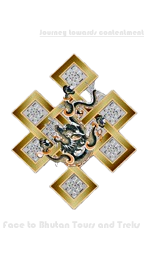Bhutan’s political system is a constitutional monarchy with democratic elements, blending traditional monarchical values with modern democratic principles. Here’s an overview of the political system:
1. Monarchy
- Role of the King: Bhutan’s King, also called the Druk Gyalpo (“Dragon King”), serves as a symbolic and unifying figure. The monarchy, known for its benevolent leadership, is highly respected, and the King holds a significant role in national identity and spiritual leadership.
- Transition to Constitutional Monarchy: In 2008, Bhutan officially transitioned from an absolute monarchy to a constitutional monarchy. King Jigme Khesar Namgyel Wangchuck, the fifth Druk Gyalpo, oversees the implementation of democracy while retaining a moral and advisory role. The King can also be removed by a two-thirds vote in the National Assembly, emphasizing accountability in the monarchy.
2. Constitution
- Adoption: Bhutan adopted its first written constitution on July 18, 2008. This document guarantees democratic rights, fundamental freedoms, and the separation of powers.
- Core Principles: The constitution reflects Bhutan’s unique philosophy of Gross National Happiness (GNH), aiming to balance spiritual and material well-being.
- Rights and Responsibilities: Bhutanese citizens are guaranteed rights to free speech, religion, and assembly, as well as social rights like healthcare and education. The constitution also outlines citizens’ duties, such as respect for the monarchy, environmental conservation, and upholding cultural values.
3. Government Structure
Bhutan has three branches of government:
- Executive:
- The executive branch is led by a Prime Minister and the Council of Ministers (Lhengye Zhungtshog).
- The Prime Minister is the leader of the party with the most seats in the National Assembly.
- The executive is responsible for implementing laws and managing public policy, especially regarding Bhutan’s development and GNH goals.
- Legislative: Bhutan has a bicameral Parliament, consisting of:
- National Assembly (Tshogdu): The lower house has 47 members, elected by Bhutanese citizens. This house is responsible for passing legislation, including budget and development plans.
- National Council (Gyelyong Tshogde): The upper house has 25 members, with 20 elected by districts and 5 appointed by the King. The National Council acts as a house of review, overseeing policies and legislation proposed by the National Assembly.
- Judicial:
- The judiciary is independent, with a hierarchical court system that includes the Supreme Court, High Court, District Courts, and Dungkhag (sub-district) Courts.
- The Chief Justice of Bhutan heads the Supreme Court. Judges are appointed by the King based on merit and experience to ensure impartiality and integrity.
4. Political Parties and Elections
- Multi-Party Democracy: Bhutan has a multiparty system with several political parties contesting national elections.
- Elections: Elections occur every five years. The National Assembly election is a two-round process. In the first round, all parties participate, and the two parties with the highest votes advance to the second round to contest the final seats.
- Election Commission of Bhutan: This body oversees elections to ensure fairness and transparency, while campaigns and political activities are regulated to align with Bhutanese values.
5. Gross National Happiness (GNH) in Governance
- GNH is Bhutan’s guiding philosophy for policymaking, focusing on sustainable development, cultural preservation, environmental conservation, and good governance.
- Policy Screening: Every policy and project is screened through a GNH framework to assess its impact on the well-being and happiness of Bhutan’s citizens.
6. Decentralization and Local Governance
- Local Government Structure: Bhutan’s local governance system includes Dzongkhags (districts), Gewogs (sub-districts), and Thromdes (urban municipalities).
- Elected Officials: Local leaders, including Dzongdags (district administrators) and Gups (village heads), are elected to represent local interests. The objective is to empower communities and promote public participation in governance.
Summary
Bhutan’s political system is a constitutional monarchy with a commitment to democratic governance and the well-being of its citizens. The King plays a significant, though largely ceremonial, role alongside elected officials who manage Bhutan’s government through democratic institutions. The political system is guided by GNH principles, emphasizing holistic development, cultural values, and environmental sustainability, creating a unique blend of tradition and modern governance.

